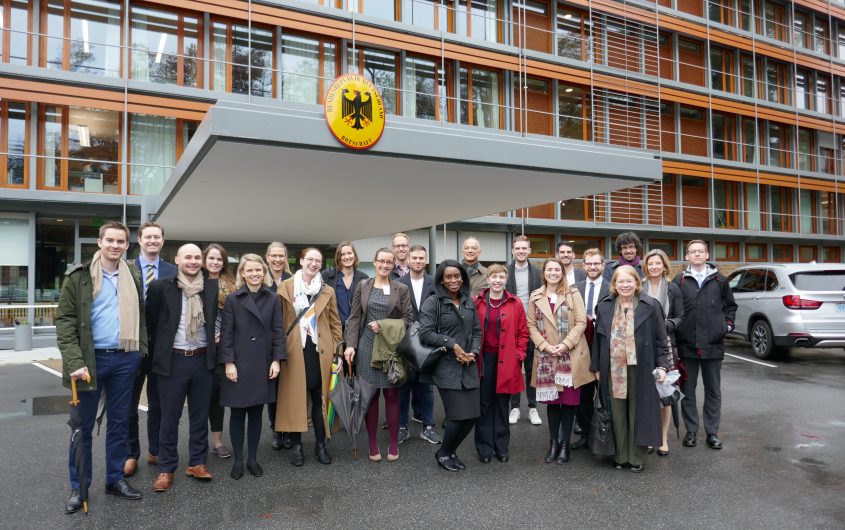
Engaging the Next Generation of Transatlantic Leaders
The project “A German-American Dialogue of the Next Generation: Global Responsibility, Joint Engagement” engages young Americans and Germans in a dialogue on relevant issues within the transatlantic relationship. The participants of this project are a variety of young leaders from different fields who have met in three groups to discuss these challenges: Foreign & Domestic Policy; Society, Culture, & Politics; and Geoeconomics. The overall goal of this project is to define the most critical challenges that pertain to the transatlantic relationship, to elaborate on the areas that should be targeted within these issues, and to recommend strategies to mitigate these areas of concern. In April, the young leaders held a conference to highlight the outcomes of this year-long project.
Reflect, Redefine, Renew: Priorities for Transatlantic Relations
The Foreign & Domestic Policy Group focused on trust building, responding to the populist challenge, reflecting on the state of transatlantic security, and responding to China and the problems surrounding technology. To begin, they recommend (re-)building trust as a course of action for strengthening the transatlantic relationship. This would mean engaging multidisciplinary stakeholders for inclusive dialogue to deepen relations between civil societies and states in both countries. The group also recommended that populism needs to be redefined more precisely, distinguishing between anti-elitist populism and anti-pluralist populism. In doing so, it was noted that the dialogue facing the populist challenge should be shifted to be more inclusive. The group then reflected on transatlantic security and the difference between operational and strategic autonomy. Germany should strengthen its own capabilities to share the burden in NATO, so that the alliance does not have to rely on the U.S. for resources. Finally, the group recommended focusing on the China challenge, noting the importance of bridging the technology gaps in both Germany and the United States. There should be consistency in China policies for both Europe and the United States, and this should incorporate a focus on investment controls.
Group Members: Lucas Dolan, Thomas Hanley, Laura Kupe, Aylin Matlé, Enes Mert, Heidi Obermeyer, Anna Stahl, Philipp Stelzel
Society, Culture & Politics
The Society, Culture & Politics group recommended reinforcing relations, refocusing on joint values, and reconsidering global responsibility in the transatlantic relationship, with an emphasis on engaging civil society to achieve these goals. The first recommendation is to reinforce relations by creating a clear communication strategy that would emphasize common short- and long-term goals for the transatlantic partnership. Civil society will be a crucial tool for communicating these narratives and mitigating the exacerbated tensions between the leadership in both countries. They also suggest increasing exchange programs to send American students to Germany as a method of building a new interest in the transatlantic relationship and opening new doors for communication. Finally, they suggest uniting immigrant populations on both sides of the Atlantic by providing funding to create a framework for organizations that represent them to jointly engage on issues that concern these groups.
The second recommendation is to refocus on joint values, seeing as democracy, human rights, and civic spaces are at risk right now. This could be achieved by promoting the underlying values of democratic rule through institutionalized spaces for exchange and dialogue. In addition to this, the group notes that there are tensions in societies regarding gender, sexuality, and religion, and they suggest strengthening rights for LGBTI so that they are treated with equal importance to religious freedom. This can be achieved by engaging with feminist and LGBTI activists in religious communities on both sides of the Atlantic and through developing foreign policy strategies to deal with gender, sexuality, and religion. Finally, the group recommends reconsidering global responsibility by engaging civil society in development aid dialogue to encourage good practices, as well as focusing on unique aspects of transatlantic challenges such as colonial art restitution.
Group Members: Phillip Ayoub, Jacob Eder, Romain Faure, Anne Jenichen, Paige Kirby, Justin Leahey, Danielle Piatkiewicz, Annika Poppe
Trade, Technology, and Human Capital: The United States and Germany in a Contested Global Economy
The Geoeconomics group organized recommendations into three categories: The future of trade and multilateralism; digitalization, data privacy, and artificial intelligence; and future-proofing the workforce and investing in the future. All of these areas focused on dealing with the China challenge, and the potential of a new economic model that could shape the dynamics of global trade. Overall, the group argues that there should be “cooperation within conflict,” noting that economic policy cannot be separated from security policy in today’s globalized economy.
In order to deal with the future of trade and the potential end of multilateralism, the group recommends that the transatlantic relationship seeks to find areas of common ground to move forward. This entails developing common norms, standards, and the elimination of trade barriers in order to promote transatlantic values on a global scale. Furthermore, they suggest demanding a level playing field by enforcing a common position on trade reciprocity and reforming trade institutions. The second recommendation series targets the challenge of digitalization, data privacy, and artificial intelligence. They recommend setting enforceable rules for emerging technologies and creating a regulatory dialogue to prevent the Balkanization of the digital economy. It should not be an “us versus them” dialogue, but rather engaging China and creating a common U.S.-EU approach to dealing with these issues will be crucial. For future-proofing the workforce and managing the increasing skills gaps in advanced economies, the group recommends that the skills needed for the economy are identified on both sides of the Atlantic. After these skills gaps are identified, training opportunities can be pinpointed by creating and deepening alliances between stakeholders. Finally, in order to invest in the future and face the challenge that both the U.S. and Germany face with regard to the shortfall in investment in human and physical capital, the group recommends increasing investment in these projects. It will be important to reconsider macroeconomic policy priorities, and whether fiscal policy can be used for macroeconmic stabilization. There also needs to be an emphasis on creating new policy spaces for dialogue regarding the slowing of the global economy.
Group Members: Andrew Bishop, Björn Bremer, Melissa K. Griffith, Philipp Liesenhoff, Henrike Lindemann, Ellen Scholl, Ines Wagner, Garrett Workman









